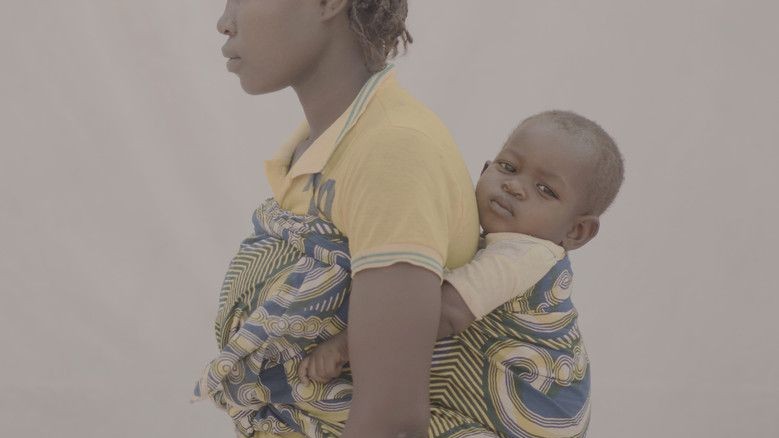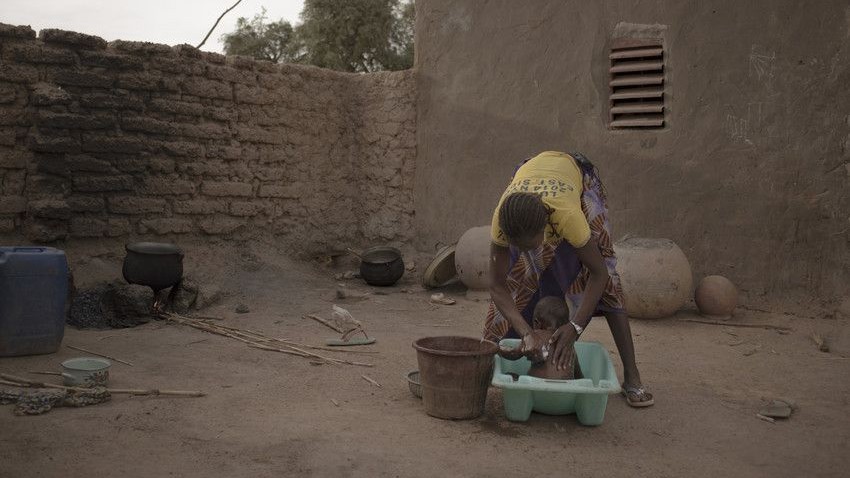I'm the Teen Mom You Don't Hear About
The kind who was raped. The kind who carried the baby to term because I didn't have any other choice.

One in every three women around the world has been abused, beaten, or coerced into sex–most often by someone she knows. Aïssa, 15, lives with her daughter, mother, and her two sisters in a rural area in West Africa's Burkina Faso. Here, she shares her story.
I was 14 when I got pregnant.
All I'd wanted to do before that was go to school. But, my education took a different turn.
Back when I took my primary school exam, my teacher said he would only tell me my grade in person—my first indication that something wasn't right. I declined. But since he now had my number, he kept calling and asking me to come and see him. Each time, I said I wouldn't go.

The author and her daughter, Fati
Then one day, he threatened me and said that if I didn't come, he would sabotage my studies: grades, performance, everything. Education is a rarity in my country—especially for girls. Most families are too poor to afford school for their children and I didn't want to jeopardize my luck. So even though I was frightened, I went to meet him at school one day. Then he raped me.
I didn't tell anyone. I knew—even at 14—that no one would believe me. He was a male teacher with all the authority of the school behind him. I was just a young girl with a "story."
Later, I learned I was pregnant—my parents noticed a change in my appetite, my body, and called it out to me. I finally broke down and told them why.
Stay In The Know
Get exclusive access to fashion and beauty trends, hot-off-the-press celebrity news, and more.
The last time I saw my teacher was outside the local police station after my parents reported the assault. He was suspended from his job for one year for raping me. That's it. Meanwhile, I was about to live with the consequences of the assault forever.
My parents and his parents agreed that his family should take care of me until the delivery—we didn't have the money for all the healthcare I suddenly needed in addition to money for school. Faced with no other options, I was forced to move in with my rapist's family for five months. They paid for my school fees and his mother took me to doctor's appointments, but they never actually gave me money for anything—not a cent. Not even for new clothes as I got farther along.
I was forced to move in with my rapist's family for five months.
My teacher never visited me throughout the entire pregnancy. On the one hand, I wanted him to acknowledge the pregnancy—to see firsthand what he did to me, and my life. But because of what he did to me, I also never, ever wanted to see him again.
After my daughter Fati was born, I went back to living with my parents, but they didn't see me the same way. My father, weirdly, became very distant. Before I was raped, my father took it as a point of pride that I had everything I needed: money for school, new clothes, etc. But after the baby came, he stopped paying for school—he stopped paying attention to me period. These days, he doesn't even want to see me.

The author bathing her daughter where they live in Burkina Faso
Sometimes I feel like he blames me for being assaulted.
Now I live with my mother, my daughter, and my two younger sisters. Without my father's financial support, I've stopped going to school—a major setback in the future I had so wanted for myself.
I wanted to be a mother—but not now. And not like this.
Most days, when I wake up in the morning, I bathe Fati and then I make some pancakes to sell. I don't make a lot of money—it's barely enough for us to survive. When I'm finished, I help my mother do some farming—she has a small plot where she grows some vegetables for us to eat and sell. I carry my baby with me the whole time.
I'm not happy as a mother. Motherhood is really painful to me because I'm reminded of all the options—avenues for my life—that were taken from me without my consent. Once when I was raped, and again when I conceived.
Now, when I see my friends going to school, it devastates me to see everything they have: They are still studying, still getting good grades, still making a future for themselves.
I wanted to be a mother later—but not now. And not like this.
The story is part of #childmothers, a global initiative between Plan International and United Nations Population Fund (UNFPA) to inspire support for young mothers and to prevent very early motherhood.
-
 Adria Arjona Smells Irresistibly Delicious Courtesy of This $48 Hair Oil
Adria Arjona Smells Irresistibly Delicious Courtesy of This $48 Hair OilPlus the makeup routine that helps her feel "like a rebel."
By Ariel Baker Published
-
 Princess Anne's Unexpected Suggestion About Mike Tindall's Nose
Princess Anne's Unexpected Suggestion About Mike Tindall's Nose"Princess Anne asked me if I'd have the surgery."
By Amy Mackelden Published
-
 Queen Elizabeth's "Disapproving" Royal Wedding Comment
Queen Elizabeth's "Disapproving" Royal Wedding CommentShe reportedly had lots of nice things to say, too.
By Amy Mackelden Published
-
 36 Ways Women Still Aren't Equal to Men
36 Ways Women Still Aren't Equal to MenFeatures It's just one of the many ways women still aren't equal to men.
By Brooke Knappenberger Last updated
-
 How New York's First Female Governor Plans to Fight for Women If Reelected
How New York's First Female Governor Plans to Fight for Women If ReelectedKathy Hochul twice came to power because men resigned amid sexual harassment scandals. Here, how she's leading differently.
By Emily Tisch Sussman Last updated
-
 Why the 2022 Midterm Elections Are So Critical
Why the 2022 Midterm Elections Are So CriticalAs we blaze through a highly charged midterm election season, Swing Left Executive Director Yasmin Radjy highlights rising stars who are fighting for women’s rights.
By Tanya Benedicto Klich Published
-
 Tammy Duckworth: 'I’m Mad as Hell' About the Lack of Federal Action on Gun Safety
Tammy Duckworth: 'I’m Mad as Hell' About the Lack of Federal Action on Gun SafetyThe Illinois Senator won't let the memory of the Highland Park shooting just fade away.
By Sen. Tammy Duckworth Published
-
 Roe Is Gone. We Have to Keep Fighting.
Roe Is Gone. We Have to Keep Fighting.How To Democracy always offers a path forward even when we feel thrust into the past.
By Beth Silvers and Sarah Stewart Holland, hosts of Pantsuit Politics Podcast Published
-
 The Supreme Court's Mississippi Abortion Rights Case: What to Know
The Supreme Court's Mississippi Abortion Rights Case: What to KnowThe case could threaten Roe v. Wade.
By Megan DiTrolio Published
-
 Sex Trafficking Victims Are Being Punished. A New Law Could Change That.
Sex Trafficking Victims Are Being Punished. A New Law Could Change That.Victims of sexual abuse are quietly criminalized. Sara's Law protects kids that fight back.
By Dr. Devin J. Buckley and Erin Regan Published
-
 My Family and I Live in Navajo Nation. We Don't Have Access to Clean Running Water
My Family and I Live in Navajo Nation. We Don't Have Access to Clean Running Water"They say that the United States is one of the wealthiest countries in the world. Why are citizens still living with no access to clean water?"
By Amanda L. As Told To Rachel Epstein Published